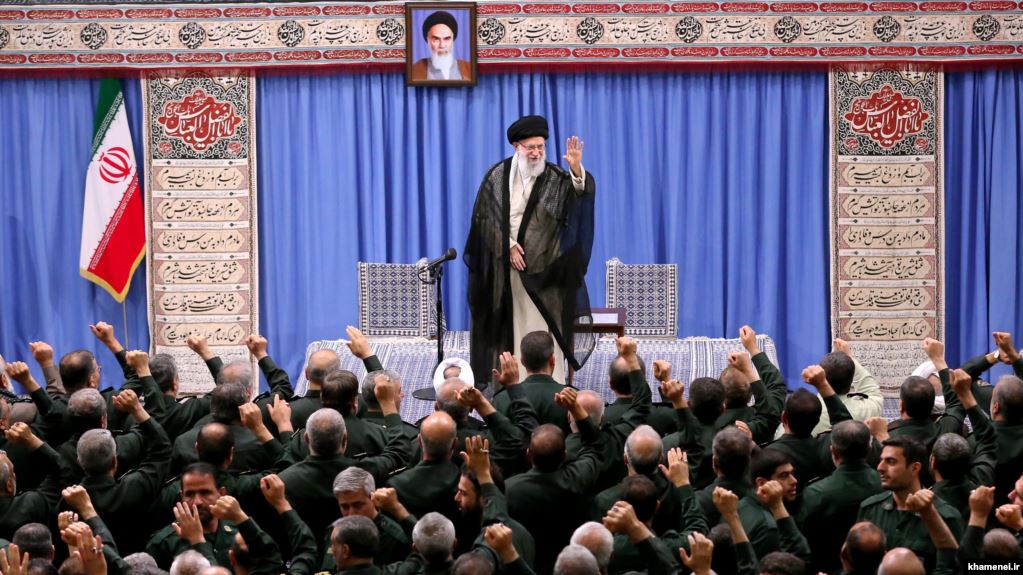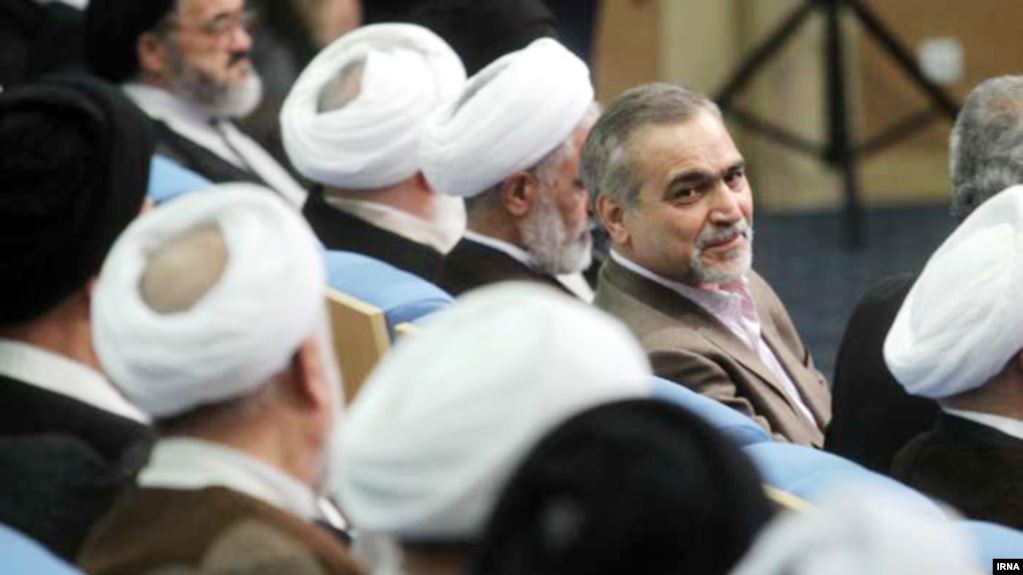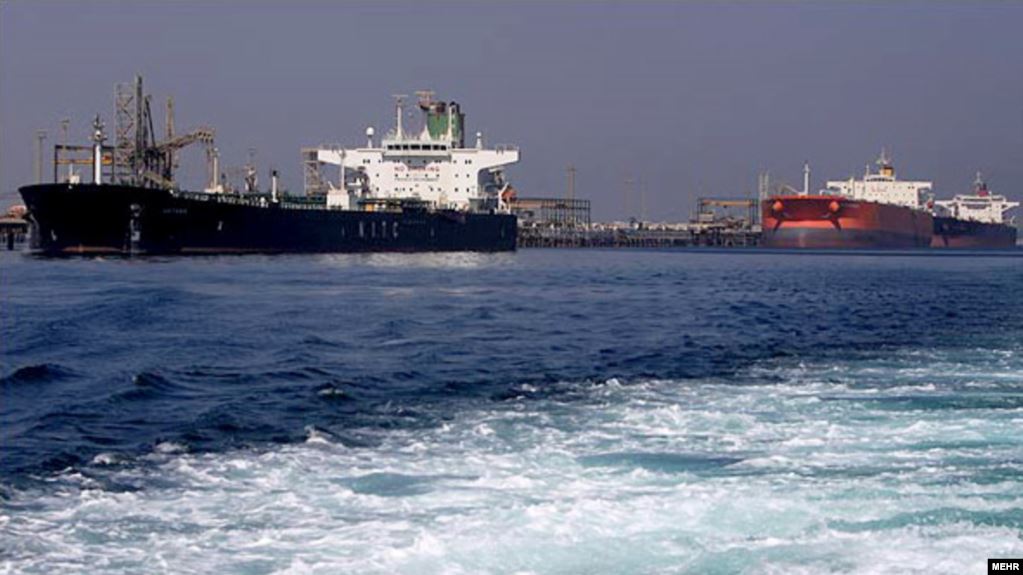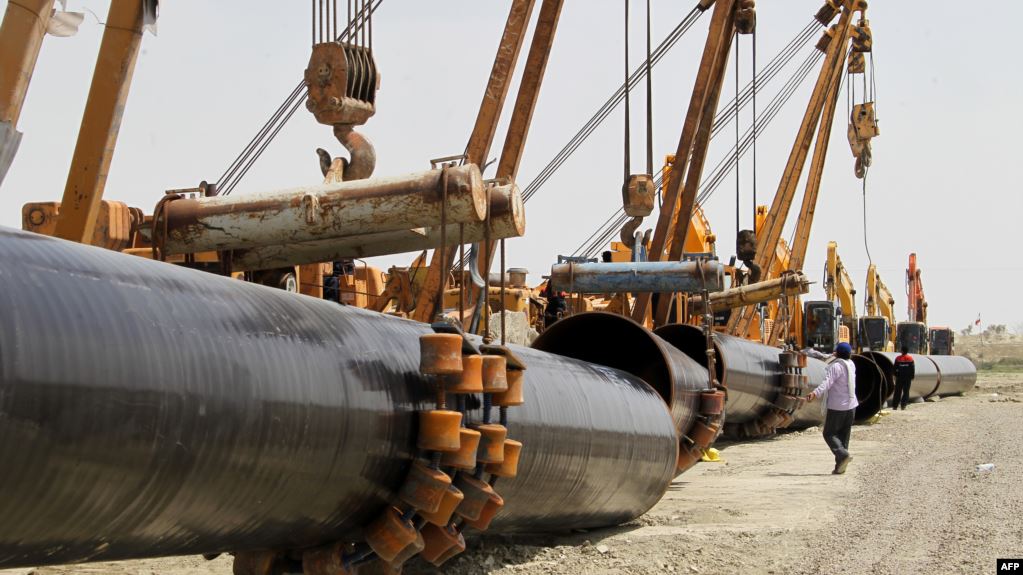![]()
Iranian Street Peddlers In Iraq
The editorial of Aftab Yazd focuses on the issue of unemployed Iranians who live in cities on the Iran-Iraq border and go to Iraq in order to earn a living through street peddling.
We cannot ban Iranian workers in Iraq who – alongside the construction work they’re doing in that country – engage in street peddling there. Naturally, when people in borderline provinces do not have jobs, they turn to temporary migration to neighboring countries including Iraq.
Usually, the lowest and toughest jobs are given to immigrants in those countries. During the past years, illegal immigrants who had come to Iran from neighboring countries were given the lowest-paid jobs in the economy, such as in the construction sector. A severe recession in Iran’s economy has forced workers to migrate illegally to Iraq. They have either turned to street peddling or found jobs in the construction sector. In Iraq, Iranian contractors hire them–illegally- under short-term residence permits.
The issue of Iranian street peddlers in Iraq is nothing new. Since the road to Karbala was opened to Iranians, even some pilgrims to this city have engaged in street peddling in this country – not portraying a good image for Iran.
However, this has become a common phenomenon, and now people from Iranian cities bordering Iraq enter the country to do this job regularly. As such, Iranian handicrafts or Iranian goods demanded by Iraqis have become common on the streets in Iraq.
Those who live close to the borders and are unemployed go to Iraq to provide for their families through such jobs. This fact cannot be ignored. Even in Iran’s eastern borders, we can now see that Iranians migrate to neighboring countries to earn a living.
A solution must be found for this issue, and jobs must be created for the unemployed in Iran’s border areas.
Aftab Yazd
Do Iranians have a share in the country’s gains and losses?
The editorial of Arman Melli raises the question of whether the Iranian people are truly benefiting from the Islamic Republic’s foreign and domestic policies.
We must accept that no society will gain much from enmity and hostility. Violence breeds violence, so if we are going to make our narrative productive in the global village, it needs to be free of violence and brutality.
The majority of people in Iranian society today do not know the reasons behind certain confrontations. If there is a philosophy behind conflict with others, then nations must make gains from conflict with others. But it can sometimes be seen that societies that possess natural resources like oil, and gas face many economic, cultural, and political challenges because of conflicts with others. The economy and culture of countries like Venezuela, Cuba, North Korea, Syria, Afghanistan, Yemen, Iraq, and Libya, etc are a proof of this fact.
Iranian society today, which is influenced by social media, can see images from the world and this raises a question as to why some countries turn out to be strong like South Korea, China, Japan, Malaysia, Turkey, India, and Brazil whereas other countries turn out to be weak like North Korea, Venezuela, Cuba, Libya.
For instance, South Korea and North Korea share the same geography, language, and race; yet, why are there obvious differences in these two countries with respect to culture, economy, and politics? What has North Korea gained from its continuous resistance? Why should the North Korean and Venezuelan people suffer so much?
Such questions are asked in Iran today and Iranian decision-makers must have convincing answers in this regard. Iranian people must really know what are their gains and losses from Iran’s domestic and foreign policies. The fact that people are resisting while some Iranian officials and their children are living a cheerful life seriously damages the social fabric of the country.
Arman Melli
Difference between Iran and Turkey in their relations with America
The editorial of Arman Melli makes a comparison between Iran and Turkey with regard to their relations with America, highlighting Turkey’s success.
A possible withdrawal of European countries from the nuclear deal (JCPOA) doesn’t seem to bother Iran very much. Tehran has prepared itself for this, and there aren’t any signs of a compromise. As for Iran’s Hormuz Peace Initiative, it seems that the Arab countries have not taken it seriously.
During the past six months, Iran’s efforts have not come to fruition, as there has been no decrease in sanctions or an increase in its oil export. Despite all the incidents that have taken place in the region, Iran’s moves to circumvent US sanctions have not had any clear results.
The Russians and Chinese may officially back Iran, but they are not doing anything serious in this regard. When Iran faced problems with regard to selling and exporting oil, the Russians didn’t even decrease their oil exports so that the Americans would be forced to allow Iran somewhat to export its oil. As for the Chinese, they won’t do anything against America as it might increase US pressures on Beijing.
If we compare Iran with Turkey, we can see that last year 46 million tourists visited Turkey last year. If each tourist spent $1000, Turkey generated $46 billion due to its tourism industry. Turkish exports also reached $140 billion. Meanwhile, in 2018 when sanctions were not re-imposed yet, Iran’s oil exports were about $44 billion. It is said that every 14th tourist creates one job, which means that Turkey has not only created income due to tourism, it has also created jobs.
As such there are two possible paths: Turkey’s path and the one taken by Iran. The Turks have had serious issues with the Americans, but they haven’t been after increasing tensions with America. In addition, no one can doubt Turkey’s independence. The most recent sensitive case was that of Russian S-400 missiles. Turkey signed a contract with the Russians, stood up against the Americans, and followed their own interests.
Arman Melli
Europe pulling out of the nuclear deal is not in Iran’s interest
As there are indications that the nuclear deal with Iran is about to collapse, the editorial of Arman Melli focuses on what Iran shouldn’t do if it is after preserving the deal.
The United States withdrawing from the nuclear deal (JCPOA) has caused harm to Iran; if the Iranian side takes retaliatory measures, then the deal will fail to exist. To counter Iran’s threat, the Europeans too have threatened to pull out of the deal.
If Iran takes the fourth step in reducing its obligations in the nuclear deal, Europe too will withdraw from the deal. Moreover, if Europe’s withdrawal takes place in accordance with the JCPOA’s mechanisms, it will send Iran’s case to the UN Security Council and the previous resolutions against Iran will be enforced again.
The Europeans will revive their sanctions against Iran, along with the US sanctions. Russia and China might be against this but will do nothing serious in this regard. In other words, the Europeans pulling out of the JCPOA will not be in Iran’s interests and it will put Iran’s foreign policy and economy in a more complicated situation and will narrow down Iran’s options.
If Iran is not interested in the nuclear deal collapsing and international sanctions returning, it should reach an agreement with the Europeans. If Iran follows the path of expanding its nuclear program, it will certainly face international reactions.
Europe thinks that the dispute between Iran and America has expanded. If this dispute isn’t resolved, there is danger of another war in the region and the crisis will extend to Europe.
The Europeans have tried to preserve the nuclear deal and to reach a security agreement with Iran over other issues. The nuclear deal is an incomplete agreement which will not help in resolving regional issues.
Earlier there was this thinking in the Islamic Republic that by reducing its commitments in the JCPOA, the Europeans would be forced to provide more concessions to Iran. But no such thing has happened. The more the security issues in the region become complicated, the more the Europeans will move towards the Americans, as they are not capable of resolving these issues on their own.
Arman Melli
![]()
Khamenei to IRGC Commanders: Be ready to confront “big events”

The Iranian Supreme Leader Ali Khamenei, in his meeting with IRGC commanders, asked them to be ready to confront “big events”, telling them not to be afraid of the enemy and to be completely ready.
The Iranian supreme leader also said, “We shouldn’t be content with our region and have nothing to do with threats beyond the borders”. Khamenei emphasized the important role of the IRGC in trans-border issues and how they are vital for the country’s strategic depth and this is the most important thing of all.
In addition, with regard to Iran’s nuclear activities, Khamenei said that the Islamic Republic will keep reducing its commitments in the nuclear deal. He added that reducing commitments would continue fully, accurately and comprehensively until “we reach our desirable goal”.
Khamenei’s speech is meant to put the IRGC in charge of strategic domestic and foreign affairs of the Islamic Republic. He has never been as dependent on the IRGC as he is today, while the IRGC has never had such an open hand in both domestic and foreign affairs of the Islamic Republic.
With fully supporting the IRGC’s domestic and foreign policies, Khamenei has backed the IRGC’s aggressive-military approach in foreign policy, as well as its interventionist approach in the country’s politics, economy, and culture.
With regard to foreign policy, Khamenei has always favored the IRGC over the Foreign Ministry. Nevertheless, in his recent speech he went a step further in unofficially setting aside the Foreign Ministry and its diplomats from the heart of the Islamic Republic’s foreign policy making.
Khamenei openly and for the first time announced that he considers the IRGC responsible for Iran’s trans-border policies. This means more challenges for the European Union and European powers.
Qassem Soleimani is Khamenei’s desirable representative in Iran’s foreign policy and not Mohammad Javad Zarif.
Radio Farda
BBC Persian
Rouhani’s brother sentenced to 5 years in jail for financial corruption

The Judiciary’s Spokesperson Gholamhossein Esmaili announced that President Hassan Rouhani’s brother has been sentenced to 5 years in prison, and he must pay a fine and reimburse 31-billion-tomans received in bribes. He added the sentence for Hossein Fereydoun was issued by an appeal court and was commuted from 7 years to 5 years.
Fars News Agency quoted an informed source as saying that Rouhani’s brother had given consultation to certain individuals for employment in banks and other major economic sectors in exchange for receiving enormous amounts of bribes.
During Rouhani’s first term, Hossein Fereydoun was his special aide and a member of the Iranian delegation in the country’s nuclear negotiations.
Other individuals, in this case, include a number of former bank governors and bank debtors, such as Rasoul Danialzadeh who was arrested in 2016 for owing more than 2000-billion-tomans to some banks in Iran.
A judicial authority announced in May that Rouhani’s brother was sentenced to jail on charges of financial corruption. Fereydoun was arrested and imprisoned in 2017 but was later released on a 50-billion-toman bail. He was one of Rouhani’s closest advisors, known as the president’s “eyes and ears” during Iran’s negotiations over its nuclear program.
The United States has repeatedly condemned institutionalized financial corruption in Iran and the plundering of Iran’s resources by relatives of senior officials in the Iranian regime. The US considers this as one of the main causes of Iran’s economic and financial problems. Recently, US Secretary of State Mike Pompeo tweeted about Iran’s authorities, saying that they were involved in corruption instead of helping the Iranian people.
Radio Farda
VOA Persian
Women rights activist’s brother arrested;

Jailed Iranian-British woman: My country put me on sale for a huge amount of money
The Iranian Intelligence Ministry has arrested Masih Alinejad’s brother, and her ex-husband’s brother and sister, on the charge of having a relationship with Masih Alinejad as well as cooperating with her.
Masih Alinejad is the founder of the White Wednesday and Stealthy Freedom campaigns, in which Iranian women share photos and video clips of themselves without wearing compulsory hijab. She met with US Secretary of State Mike Pompeo, calling for sanctioning Iran’s state-run TV, the IRGC, and other oppressive Iranian organizations.
Iranian judiciary officials have threatened those who send photos and video clips to Masih Alinejad with a 15-year imprisonment sentence.
After her brother, Ali, was arrested, Masih Alinejad released a three-minute video clip of her brother’s remarks indicating increasing pressure on her family by Iran’s security agencies. Ali Alinejad, in the video clip recorded before his arrest, said Iran’s security agencies have pressured Masih’s family to talk against her on state-run TV.
Meanwhile, Nazanin Zaghari-Ratcliffe, the Iranian-British citizen imprisoned in Tehran’s Evin prison, has written a letter, accusing Iran of putting her on sale for its own political demands. “My country put me on sale for a huge amount of money because of its own political demands last week,” she wrote.
This Iranian-British prisoner was referring to Iran’s Foreign Minister who asked Britain to pay its 400-million-pound debt to Iran in exchange for Zaghari’s release.
“How bitter is the day when you realize you have been imprisoned in your homeland with utmost injustice and there is no way out,” she wrote. Zaghari continued that Iranian authorities “fiercely defend Syrian, Yemeni and Palestinian mothers, yet ignore a mother’s pain of being away from her child in their own country.”
40-year-old Nazanin Zaghari-Ratcliffe, a project manager with the Thomson Reuters Foundation, was arrested at Tehran’s Imam Khomeini airport when visiting Iran in 2016 with her then-22-month-old daughter. She was sentenced to five years in prison for attempting a “soft-overthrow” of the establishment.
Radio Farda
BBC Persian
Iran’s export of gas condensate reaches to almost zero

The Spokesperson for Iranian Oil, Gas and Petrochemical Products Exporters’ Union, Hamid Hosseini, said that due to sanctions, the level of gas condensate exports has reached to almost zero.
Production of gas condensate in Iran, particularly in South Pars field, is about 650,000 barrels per day, of which 400 to 450 thousand barrels are consumed domestically. In 2017, Iran exported more than 17 million tons of gas condensate worth $7 billion.
Iran includes gas condensate under non-oil exports, and before the sanctions, this product’s share in the total non-oil exports of the country was 25%. Currently, Iran produces 150 to 200 thousand barrels of extra gas condensate.
According to Hamid Hosseini, the US sanctions have created many problems for transporting and transactions in this regard. He pointed out to lack of interest in buying gas condensate in Iran’s energy stock market, saying that due to the international sanctions, foreign companies are not interested in participating in this market. It seems unlikely, he added, that in near future, gas condensate will find any customers in the energy stock market.
Radio Farda
Construction of an oil pipeline in Iran to bypass the Strait of Hormuz

The Iranian Oil Minister Bijan Zanganeh announced the construction of a pipeline from Goore to Jask for transporting Iran’s oil to the Sea of Oman’s coast.
According to the website of Iran’s National Oil Company, this 42-inch pipeline will be 1100-km long, with a capacity to transport 1 million barrels of Iran’s oil from the Goore terminal in Bushehr in the Gulf to Jask port in Hormozgan province in the coastal waters of Sea of Oman.
This $1.8 billion plan is launched while during the past months tensions have increased in the Gulf and the Strait of Hormuz. With constructing this pipeline, Iran can send its oil to the market without passing through the Strait of Hormuz.
Goore-Jask pipeline was designed in 2012 when the West’s sanctions against the nuclear program were implemented, but now Iran has announced signing contracts with domestic companies to launch the construction of the pipeline.
This pipeline is reportedly to avert any difficulties in exporting Iran’s oil due to possible problems in the Gulf and the Strait of Hormuz.
Radio Farda
